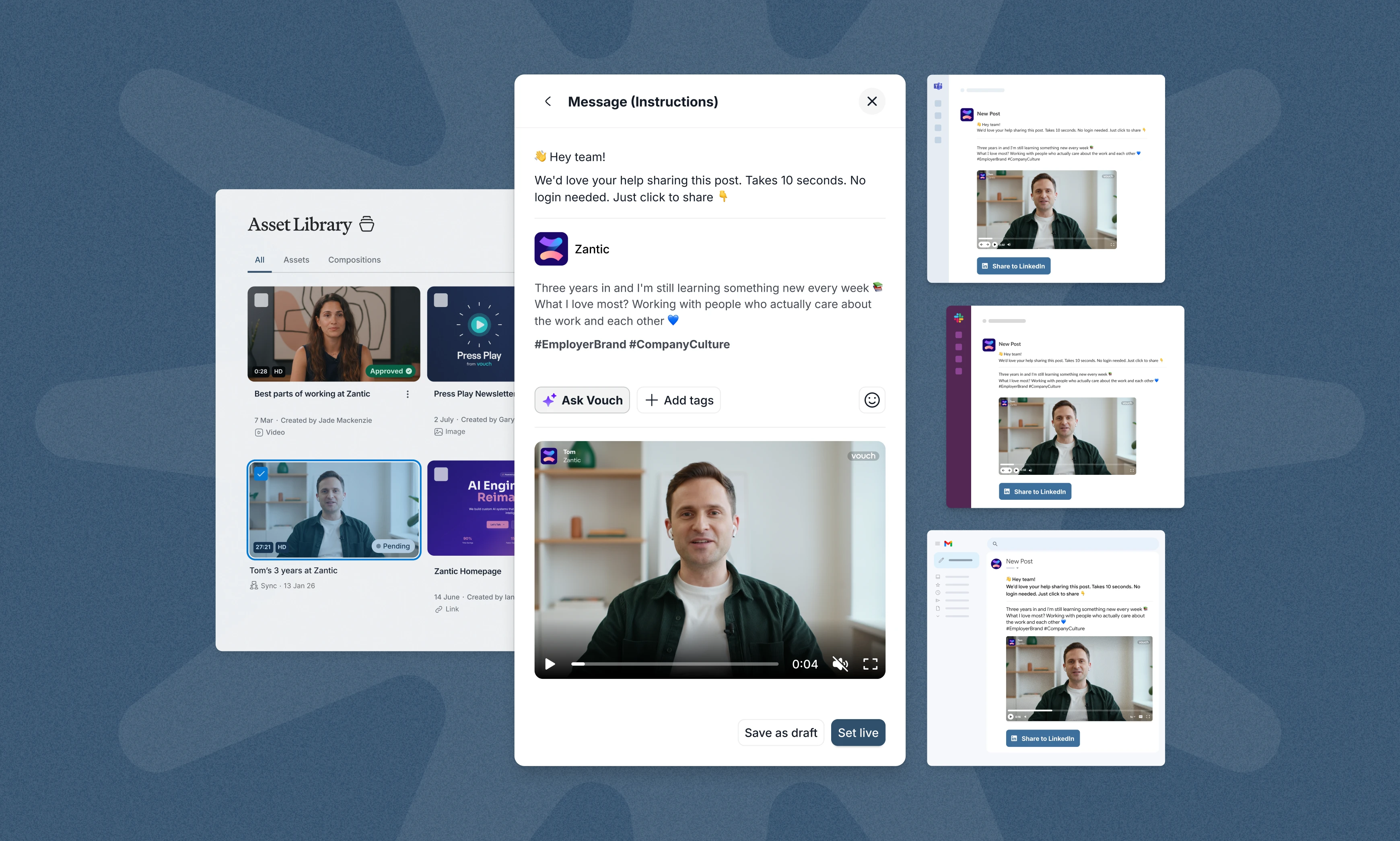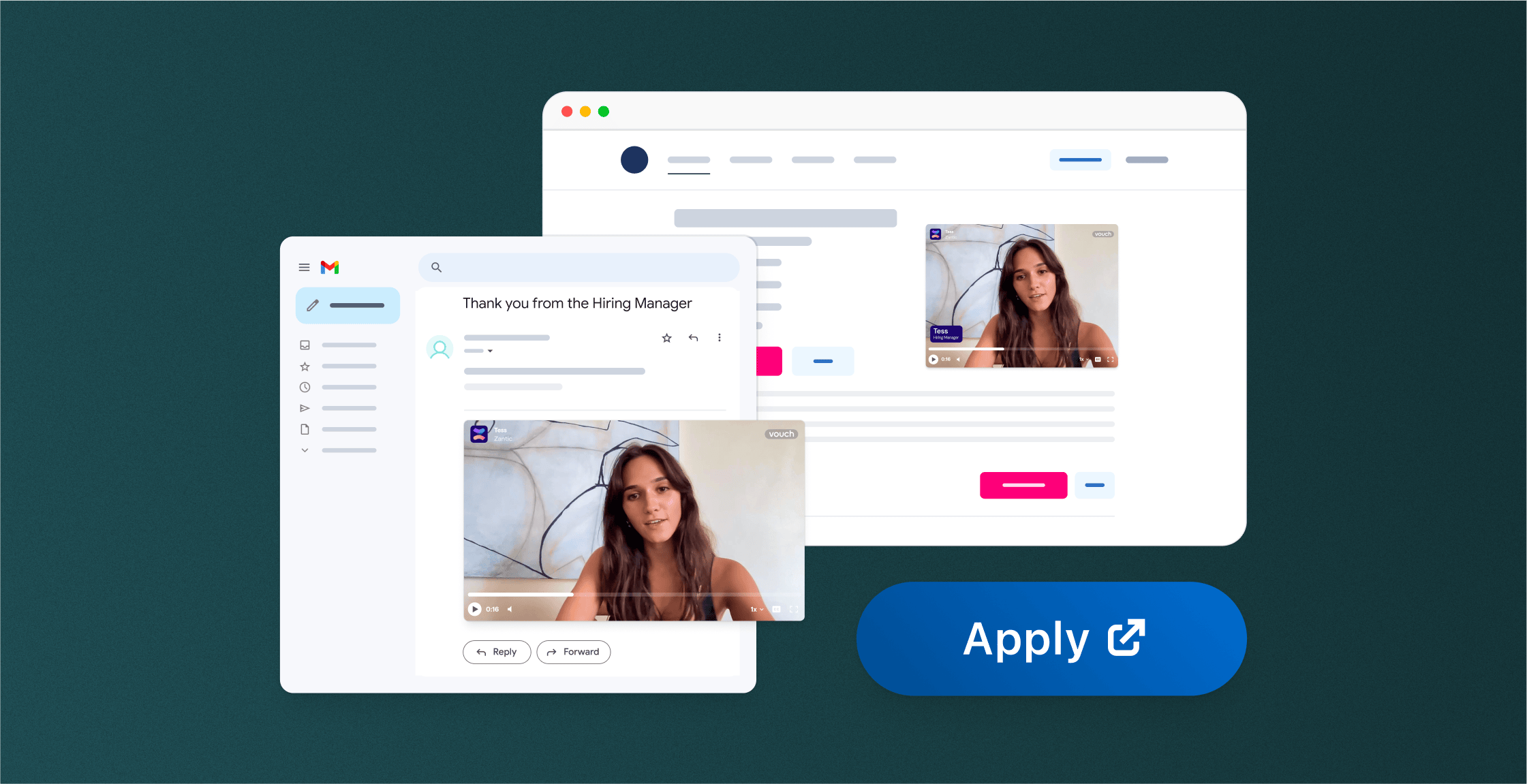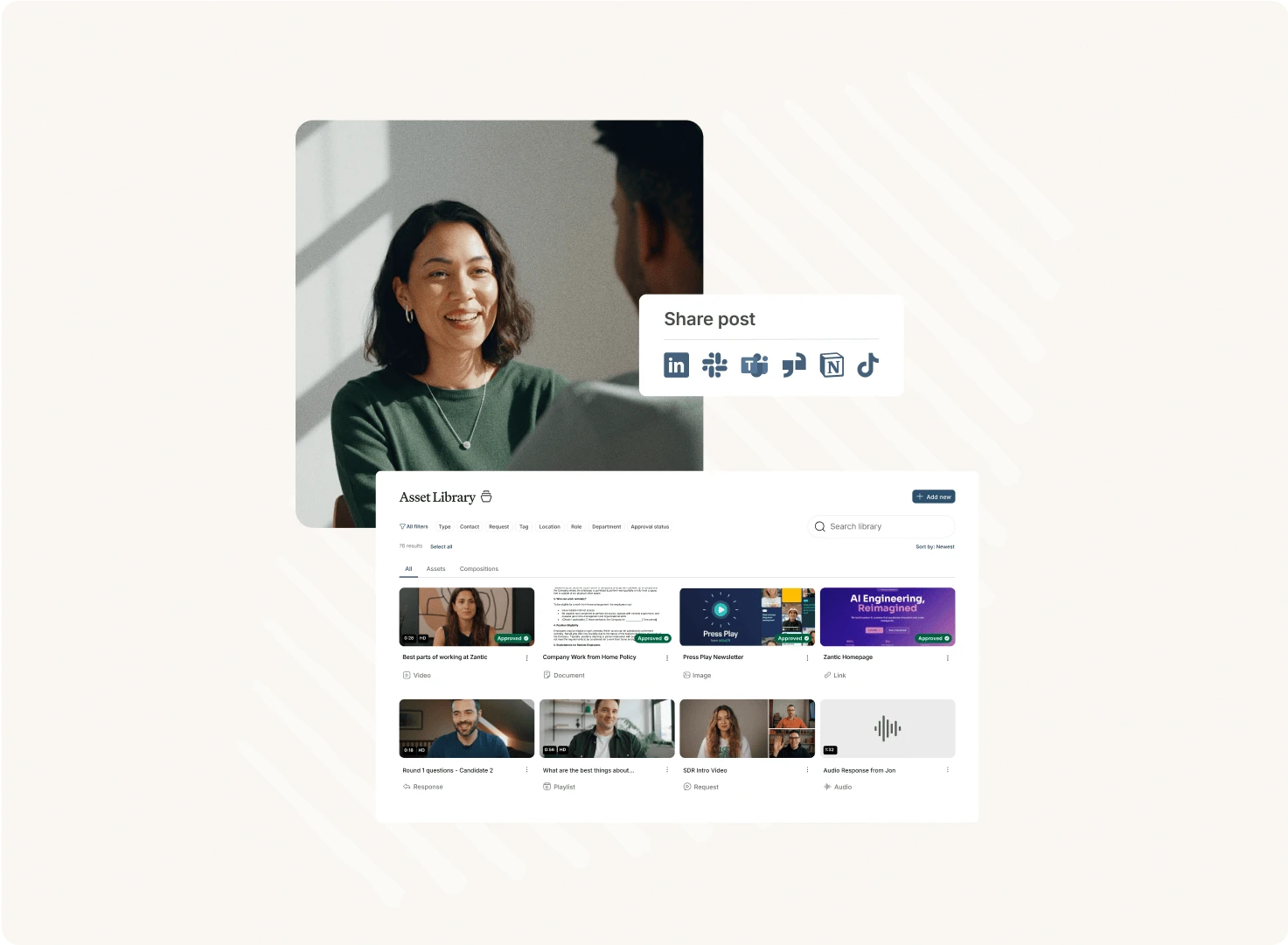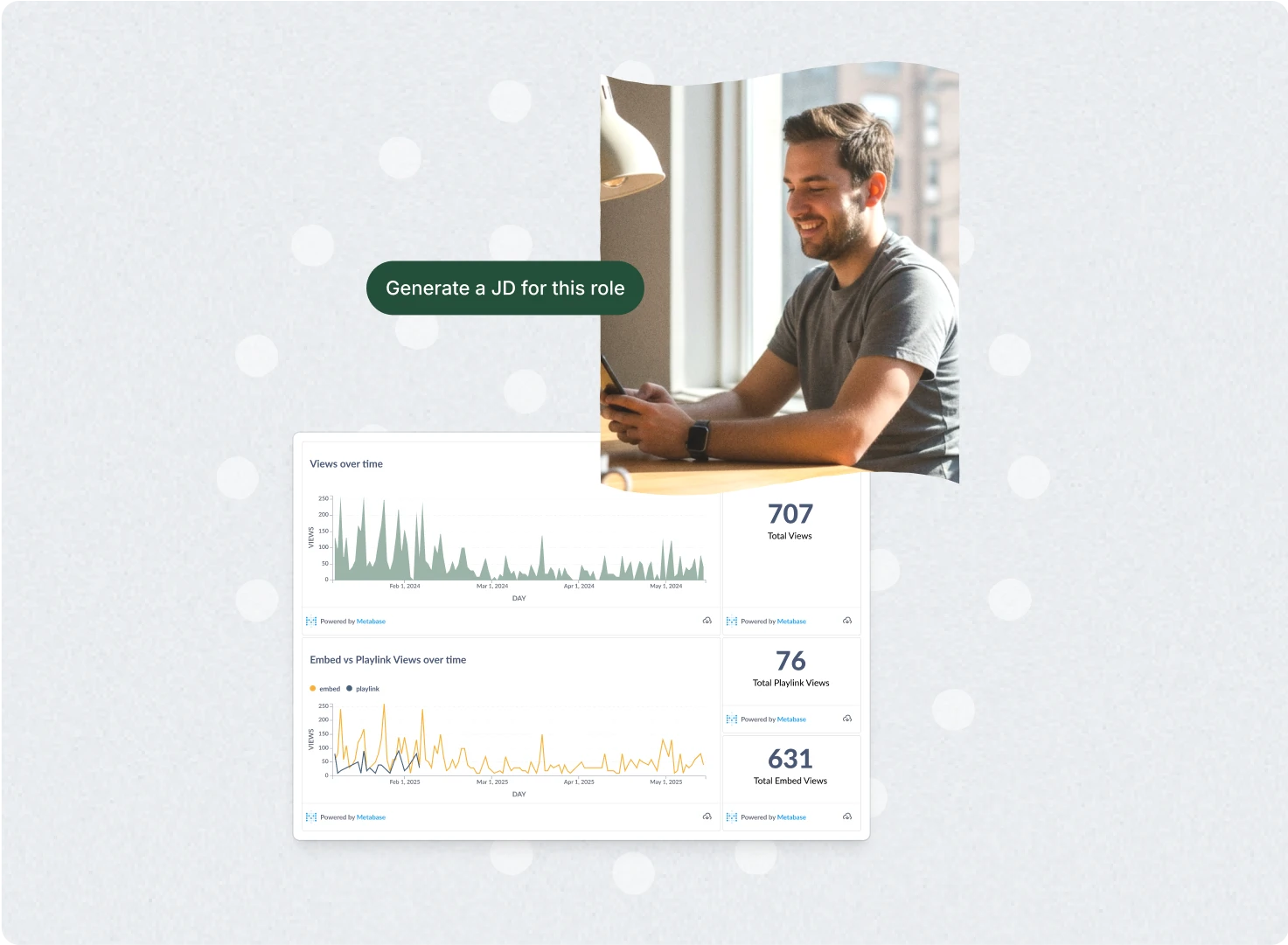Talent teams, often nestled within the Human Resources (HR) department, are the backbone of any organization's workforce strategy.
The primary role of your talent teams is to ensure your businesses attract, develop, and vitally retain quality talent to meet your organizational goals.
But their responsibilities go far beyond just hiring right into the heart of your employer brand.
So, let's unpack your talent team's key functions, be it one talent expert or a large team, and also look at some real data showing how your talent team can help your organizations thrive.
How Do Talent Teams Find and Attract Talent?
Talent acquisition experts within your talent team (individually known as TAs) are experts at sourcing suitable candidates and creating a robust - repeatable talent pipeline.
Your talent team finds and attracts top talent by building and leveraging your employer brand, creating targeted job ads, and being social media experts - and their skill sets go even further beyond this.
Here's how they do it:
- Leverage tools like Vouch: When it comes to attracting top talent, having your own recruitment enablement content is vital. Tools like Vouch for video creation and Canva for graphics are invaluable.
- Experts at social networks: Platforms like LinkedIn and X are invaluable for connecting with passive candidates and active talent communities. Your TAs need to be social media gurus.
- Build an alumni network talent community: Building your talent pools can include social media groups and even engaging former employees, or boomerang employees, to provide access to highly skilled talent.
- Collaborate with external staffing agencies: External agencies are often bought on when customized workforce solutions are needed, such as for bulk hiring or fulfilling a unique role, like an executive position - they help meet both short-term and long-term needs.
Statistics:
According to LinkedIn's Global Talent Trends Report (2022), 70% of the global workforce comprises passive candidates who aren't actively job searching but are open to opportunities. This highlights the importance of proactive engagement strategies. Source: LinkedIn Talent Trends Report
The AI-enabled workspace for talent teams.
- Unified workspace for talent teams
- Accelerate hiring with AI tools
- Auto-generate polished hiring and employer brand content
- Easily repurpose assets across all channel
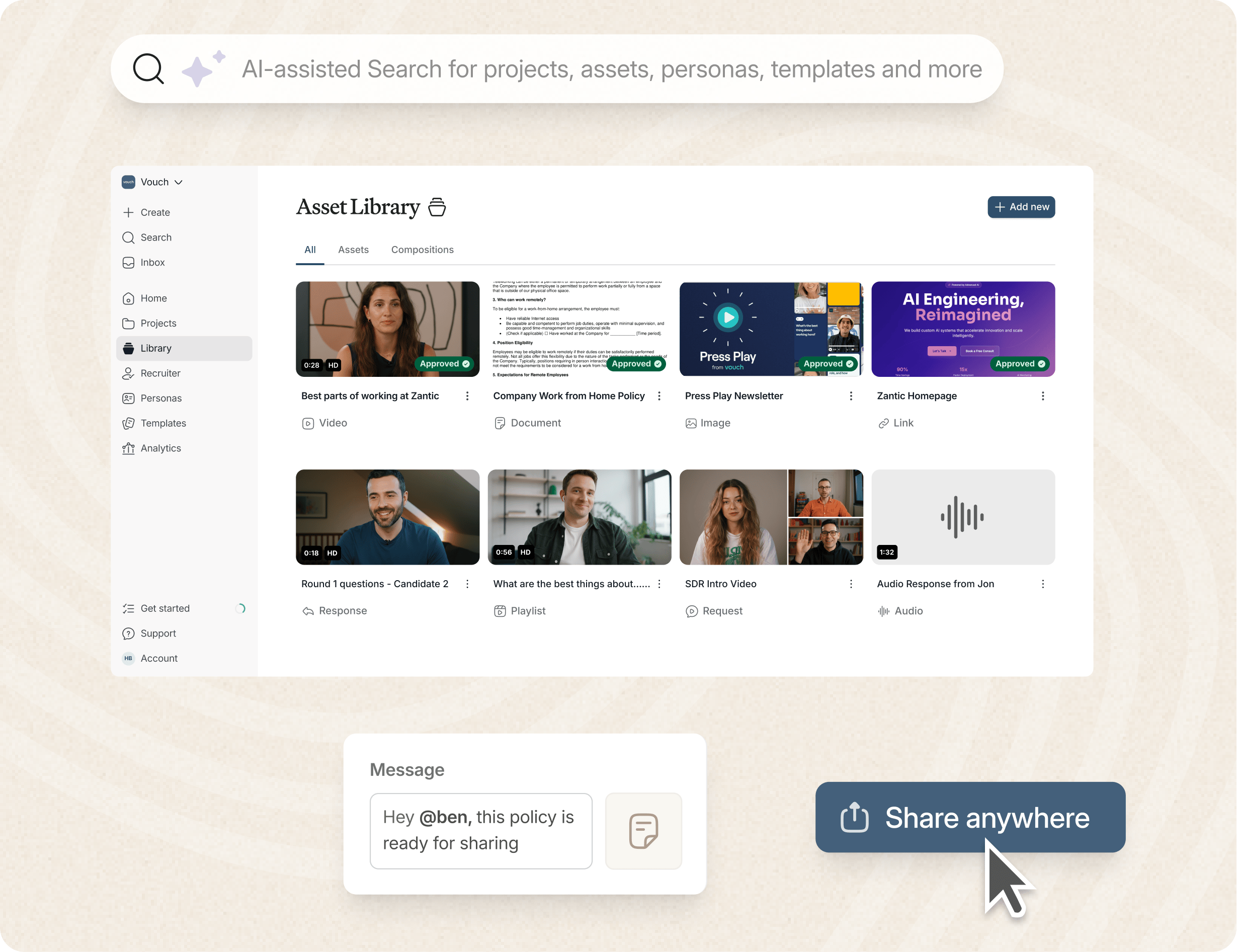
What's Your Talent Teams Role in the Recruitment Process?
A smooth recruitment process is vital to finding the ideal candidate profile.
Talent teams drive recruitment by identifying your organizations needs, sourcing top-quality candidates, streamlining hiring, and ensuring a seamless journey from application to onboarding.
Talent teams help by:
- Developing or optimizing your recruitment strategies to ensure they are tailored to your company's deeper & future strategic needs, which your executives and HR company leaders often drive.
- Talent teams use lots of tools like personalized video tools and applicant tracking tools to organize and assess potential candidates efficiently.
- Reduce the burden of bulk or hard-to-source recruitment by partnering with creative agencies or staffing agencies.
- Conduct candidate background checks and use assessment tools to evaluate both technical and soft skills. Vouch can also help here.
Statistics:
Organizations with a structured recruitment plan reduce time-to-hire by 40%, according to a study by the Society for Human Resource Management (SHRM). Source: SHRM Hiring Metrics
How Do Talent Teams Support Employee Development?
Once qualified candidates are hired, talent teams shift their focus to creating employee growth and skill expansion - from talent acquisition to talent development.
This involves:
- Creating employee development plans that align with your strategic business goals.
- Offering developmental opportunities like microlearning for job training, leadership training, and opportunities for learning and, ideally, moving up in your company.
- Addressing the skills gap by identifying critical skills and developing tailored talent development strategies. Again, microlearning with tools like Vouch can be invaluable.
- Building an inclusive company culture to enhance employee engagement and retention.
Statistics:
Companies that invest in talent development efforts see a 58% increase in employee retention, according to the Association for Talent Development (ATD). Source: ATD Talent Development Report
How Do Talent Teams Impact Employee Retention?
Retention strategies are crucial for keeping top performers - and your talent teams are there to drive employee retention by hiring the right people in the first place, building a culture of growth, and creating a culture where employees feel valued, supported, educated and motivated to stay. Basically, they need to know you care about their well-being and growth, too.
Talent teams help retain your employees by:
- Identify and nurture talent and future leaders through succession planning and ongoing training.
- Regularly review employee performance and adjust development plans as needed. Vouch is a great tool when it comes to gathering employee feedback, such as creating employee spotlight videos or doing a company temperature check.
- Offer awards and other incentives to employees to help recognize their accomplishments to boost morale. Talent teams are also experts at saying "thank you" : )
- Support talent mobility by facilitating internal transfers and promotions.
Statistics:
Glassdoor's Employee Retention Report found that a 10% increase in employee engagement can lead to a 5% decrease in turnover rates. Source: Glassdoor Retention Insights
What's Your Talent Teams Role in Long-Term Business Strategy?
Talent teams don't just fill immediate vacancies; they're integral to achieving organizational performance and business objectives.
Their role includes:
- Aligning talent management with your business strategy and overall organizational goals.
- Developing talent management initiatives that prepare the workforce for anticipated and unanticipated events, such as education on AI technology and how your industry is preparing for any immediate transitions.
- Ensuring succession planning for seamless leadership transitions.
Statistics:
McKinsey reports that 84% of executives believe a clear talent strategy improves overall business performance. Source: McKinsey Talent Report
What Tools and Methods Do Talent Teams Use?
Modern talent teams rely on a variety of tools to streamline their work, including:
- All-in-one hiring platforms like Greenhouse and Workday.
- Content production and recruitment enablement tools like Vouch.
- Assessment tools for evaluating innate talents and technical skills.
- Remote broadcasting tools and virtual events for engaging with remote or dispersed talent pools.
- Analysis tools to monitor hiring metrics, retention rates, and overall workforce health.
Statistics:
According to Deloitte's Human Capital Trends Report (2023), companies using AI-driven hiring tools saw a 35% improvement in the speed and accuracy of hiring decisions. Source: Deloitte Human Capital Trends
How Do Talent Teams Prepare for the Future?
Working with your HR and company leaders, your talent teams always have one eye on the future. They:
- Identify critical decision points to avoid human capital mistakes.
- Develop a comprehensive talent development plan for both current employees and potential candidates.
- Build a broader workforce by incorporating a contingent workforce where needed.
By focusing on future needs, talent teams help organizations adapt to market changes and stay competitive.
FAQs
What’s the main role of a talent team?
Talent teams find, grow, and keep amazing people to help your company hit its goals.
How do talent teams engage employees?
They create growth opportunities, support learning, and build an inclusive, supportive work culture.
What’s a talent pipeline?
It’s a pool of skilled candidates ready to fill roles quickly when needed.
Why is employee retention necessary?
Keeping employees saves money, keeps things running smoothly, and boosts team morale.
What tools do talent teams use?
They use tools like applicant trackers, content tools like Vouch, skills assessments, and hiring platforms to find and manage talent.
What are boomerang employees?
They’re people who leave a company, gain experience elsewhere, and then come back.
How do talent teams address the skills gap?
By offering training, development programs, and upskilling opportunities to bridge knowledge gaps.
Summary
Talent teams are the unsung heroes of any organization, driving growth and aligning talent management with business goals.
Whether it's sourcing best-fit candidates, improving employee engagement, or ensuring succession planning, their work touches every aspect of your workforce.
If you've ever wondered how leading organizations achieve their recruitment objectives or retain their 10x performers, now you know - it comes down to the expertise of talent teams and the strategies & tools they use.
See Why Talent Teams Use Vouch!
Loved by companies like Canva, Nike, Cisco, HubSpot, Amazon, and more, tools like Vouch make leveraging video in your business and talent acquisition remarkably easy.
Be sure to book a Vouch demo today and chat with a video content expert.
You might also like

Elevate Your Brand Today With Vouch
Discover how Vouch can accelerate talent acquisition while helping you stay on-brand.

